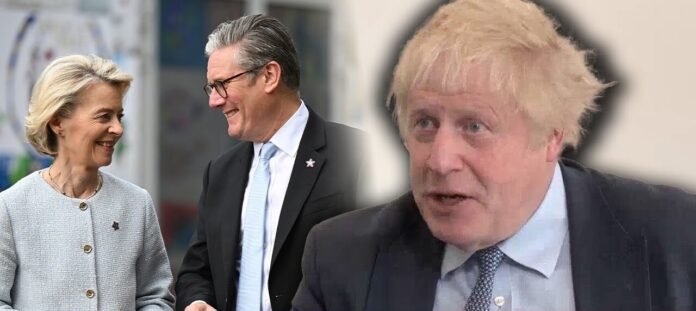Keir Starmer’s modest EU reset prompts hysterical fury from Brexiters clinging to past glories
It felt like 2016 all over again. Britain’s political class seemed gripped by a peculiar relapse—an acute flare-up of Brexit Derangement Syndrome. Euphoric recall mingled with post-traumatic stress. Reason gave way to rage as Keir Starmer unveiled his modest reset of UK-EU relations, provoking a tidal wave of indignation long before any details were even made public.
Like every UK-EU negotiation, this one went to the wire. No one ever walks away with everything they want, least of all from Brussels. The EU wasn’t about to loosen its agricultural standards without claiming something on fish in return. A lesson, perhaps, in how leverage works. Still, even before the final communiqué emerged, familiar faces from the Brexit pantheon were already calling it treason.
Daniel Hannan—now Lord Hannan, astonishingly—took to X to declare Britain had become the EU’s gimp. His vision: the UK bound in leather, ball-gagged by Brussels. David Frost—also Lord, against all logic—resurfaced as a tortured soul, desperate to distance himself from the Brexit deal he negotiated. He now wanders the political wilderness, searching for someone else to blame. He is Lady Macbeth in a cravat, trying to scrub the blood of a botched Brexit from his hands.
These figures seem to have forgotten how deals are made. The give and take. The mutual rules. Even Boris Johnson couldn’t resist joining the gimp-mask chorus, presumably dialling in from a man-cave filled with dusty Churchill biographies and… other items Carrie hopefully doesn’t know about.
But facts—and reality—be damned. By Monday morning, Starmer stood at Lancaster House alongside European Commission President Ursula von der Leyen and European Council President António Costa. Costa, always soporific, muttered vague niceties about “new chapters.” Von der Leyen was clearer: the UK and EU had found common ground on defence, energy, fishing, and youth exchanges. “No free movement,” she stressed. No return to the single market. Just cooperation with boundaries.
Then came Starmer, emboldened by earlier trade progress with India and the U.S. He hailed the deal as the next best thing to full market access, without rejoining the customs union. He reminded sceptics that Britain’s fishers export 70% of their catch to the EU, because Brits don’t much like the fish we catch. This wasn’t surrender. It was pragmatism.
Yet it wasn’t facts the media wanted—it was blood. Hadn’t he caved to Brussels? Was this not rule-taking in disguise? Starmer stood firm. He was here to grow the economy, create jobs, and stabilise a trade regime in tatters since 2020.
The obvious truth remained unsaid: Brexit made Britain poorer. And no one voted in 2016 to leave the single market or customs union. That came later, thanks to a handful of zealots who confused nationalism for strategy.
But in GB Newsland, the Tories were ready to pounce. Never mind, they’re lightyears from winning power. Kemi Badenoch emerged from a broom cupboard to denounce Starmer’s betrayal—her mic barely functional, her impact even less so. She spoke of “five golden rules,” which seemed to mystify even her colleagues. Meanwhile, Priti Patel mumbled something inaudible and forgettable, a career highlight.
Then came Victoria Atkins. And the fish. Yes, the fish. She read a monologue supposedly from a patriotic hake called Harry, declaring his willingness to die British rather than be consumed by “a Frenchie or Kraut.” GB News lapped it up. Everyone else blinked in disbelief.
What Starmer achieved was modest but rational. He didn’t drag Britain back into the EU. He didn’t reverse Brexit. He simply tried to make it less disastrous. You’d think he’d asked to rejoin the Holy Roman Empire.
But in this bizarre political theatre, even common sense is betrayed—and every fish has a flag.
BBC
Prime Minister Keir Starmer’s new UK-EU agreement, unveiled at the first post-Brexit summit in London, aims to ease trade friction and boost defence cooperation. Framed as a “reset,” the deal avoids rejoining the EU’s customs union, single market, or freedom of movement—guardrails set by Starmer to avoid reigniting Brexit divisions. The agreement includes limited dynamic alignment with EU rules, prompting backlash from Brexiteers who see it as a sovereignty concession, and Remainers who criticise its lack of ambition. Starmer claims it strengthens ties with major economies, including the US, India, and the EU. While the deal smooths some trade hurdles, key details—like youth mobility, mutual recognition of qualifications, and airport checks—remain unresolved. Critics warn of uncertain costs and limited influence over evolving EU rules. The UK-EU summit will now be an annual event, signalling ongoing negotiations and cooperation. The deal reflects an uneasy, cautious move towards closer ties without undoing Brexit’s core tenets.
